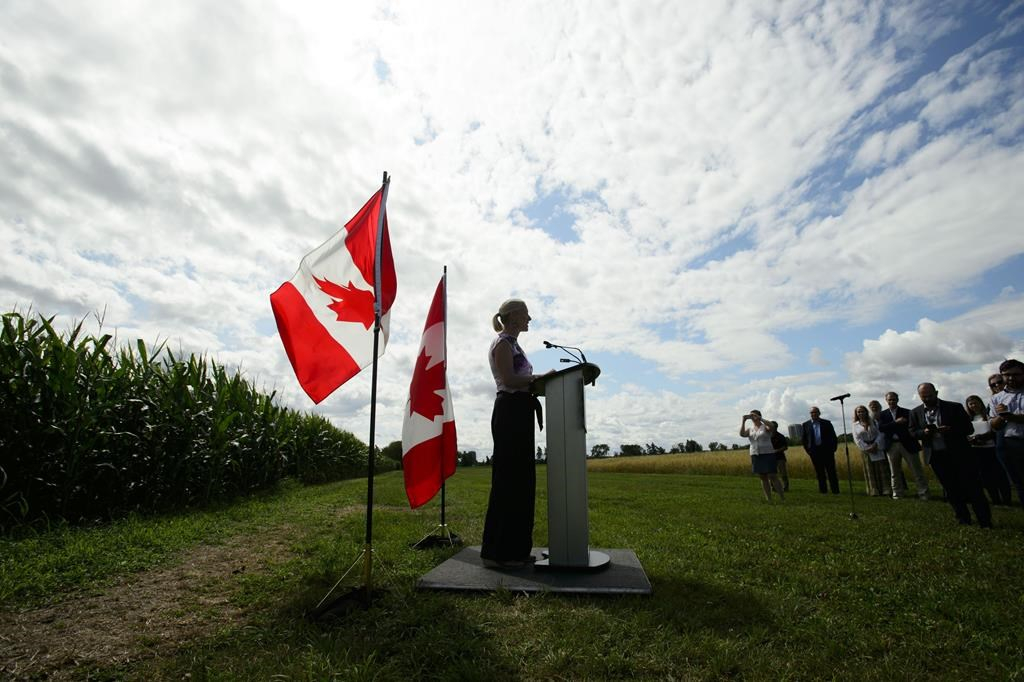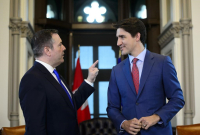Support strong Canadian climate journalism for 2025
Long-simmering political differences over climate change boiled over into a series of personal attacks between the Liberal and Conservative leaders on the campaign trail Tuesday.
Liberal Leader Justin Trudeau characterized his Conservative opponent Andrew Scheer as a do-nothing denier of climate change, lumping him in with other political opponents such as Jason Kenney and Doug Ford, the Alberta and Ontario premiers.
Scheer branded Trudeau an irresponsible steward of the public purse who was doling out vague and desperate environmental promises that would ruin Canada's economy.
Amid it all, Trudeau and NDP Leader Jagmeet Singh found time for a quiet word by phone about the times Trudeau darkened his skin to put on blackface and brownface for costume events, acts he now concedes were racist.
Singh had agreed to talk to Trudeau about the incidents, the most recent of the three at an "Arabian Nights" theme gala at the Vancouver school where Trudeau taught in 2001. But he wanted the conversation to be private. The first visible-minority leader of a federal Canadian party, currently campaigning against Trudeau to become prime minister, didn't want to be used in a political effort to repair Trudeau's image.
And in the event the exchange was just between them, conducted while Singh was at the back of his campaign bus. Reporters riding with him were told about it afterward, with no details except that it had occurred.
Earlier, the campaign's tone was anything but civil.
The Liberals unveiled two key planks in their environment platform Tuesday: a commitment to combat climate change by achieving zero net carbon emissions in Canada by 2050 and halving the income-tax rate for companies that produce zero-emission technologies.
The pledge would bring Canada in line with a promise made by 65 other countries at this week's United Nations Climate Summit to work to become carbon-neutral by mid-century. Trudeau hitched his wagon to teenaged climate activist Greta Thunberg who has pointedly scolded world leaders this week at the UN for their inaction on climate change.
"These kids are scared because they know this will become their mess to clean up," Trudeau said in Burnaby, B.C., at a company working on cutting-edge battery technology for uses such as electric vehicles.
"Doug Ford, Jason Kenney, Andrew Scheer — this generation of Conservative politicians are all the same when it comes to the environment. They just don't care and they just don't get it."
Scheer dismissed the Liberal climate plan, calling Trudeau "a master of improvisation" who is making policy up on the fly. And he reiterated his past criticism of the Liberals' carbon tax, saying it makes life more expensive for Canadians.
Scheer was non-committal about whether a Conservative government would consider adopting the zero-carbon target itself.
"We are committed to the targets that we have signed onto. We have committed to implementing our real plan for the environment, which gives Canada the best chance to reach those targets," Scheer said at an event in southwestern Ontario prior to Trudeau's appearance in B.C.
After Trudeau spoke, the Conservatives released a statement that hit back hard at Trudeau, saying his "desperate" plan would cost billions of dollars, jeopardize hundreds of thousands of jobs, raise taxes by $3,000 per family and increase gas by 73 cents a litre.
"He will destroy the economies of British Columbia, Alberta, Saskatchewan and Newfoundland, while also destroying the manufacturing sector in Ontario and Quebec," the Conservative statement said.
The Liberals planned to release three new television ads on Tuesday that place climate change front and centre. The ads extol the Liberal measures on the environment, such as moving toward a ban on harmful single-use plastics, protecting marine areas, committing to a phase-out of coal power in favour of renewable energy sources and "putting a price on pollution that causes climate change" — Trudeau's frame for the carbon tax that Conservatives bitterly oppose.
And the paid messages also attack Scheer directly, saying he "doesn't think it's possible to grow the economy and fight climate change."
In Winnipeg, the NDP's Singh said Trudeau's environment policies have failed Canadians, which is why young people are taking to the streets to express their concerns about the fight against climate change.
"No one believes that Mr. Trudeau is going to actually follow through on those commitments," Singh said, as he shared his own plan for dealing with climate change, which includes building an east-west corridor to carry clean energy across the country. Manitoba and Quebec have access to huge sources of hydroelectric power, for instance, but tenuous links to potential consumers in places such as Ontario and Alberta.
After Trudeau's appearance in Burnaby, the New Democrats released what they called a "reality check" on the Liberal climate plan. It consisted of four words: "You. Bought. A. Pipeline."
The Liberal government's purchase last year of the Trans Mountain pipeline has heightened B.C.'s Lower Mainland status as a major political battleground. The pipeline — if completed — would triple the flow of oil from Alberta to a sea terminal in Burnaby.
After his climate change announcement in Winnipeg, Singh headed west to his Burnaby South riding, hours after Trudeau staged his climate announcement there, for his own town hall at the end of the day.
Scheer was focusing on battleground Ontario, making stops in southwestern Cambridge, Kitchener and London, alongside Conservative candidates who are all trying to take ridings back from Liberals who won in previously held Tory areas.
Over in Atlantic Canada, Green Leader Elizabeth May was in Sackville, N.B., where she was also highlighting promises from her platform to cut greenhouse-gas emissions. That included new approaches by Canada Post to use its infrastructure to serve communities. Post offices would host electric-vehicle charging stations, for instance, and mail-carriers could be asked to check in on vulnerable residents along their routes.
The Green plan also includes developing a national transportation strategy, with a zero-carbon goal for public ground transportation in Canada by 2040.
This report by The Canadian Press was first published Sept. 24, 2019.




Comments
Greta Thunberg, 23 Sept: "People are suffering. People are dying. Entire ecosystems are collapsing. We are in the beginning of a mass extinction, and all you can talk about is money and fairy tales of eternal economic growth. How dare you!"
----------------------------------------------------------
Andrew Scheer, 24 Sept: "Trudeau's desperate plan will cost billions of dollars, jeopardize hundreds of thousands of jobs, raise taxes by $3,000 per family and increase gas by 73 cents a litre."
Justin Trudeau, 24 Sept: "Scheer doesn't think it's possible to grow the economy and fight climate change."
-----------------------------------------------------------
CBC, 26 Sept: "Greta Thunberg was right: There is an alternative to eternal economic growth." https://www.cbc.ca/news/business/business-climate-strike-1.5293916